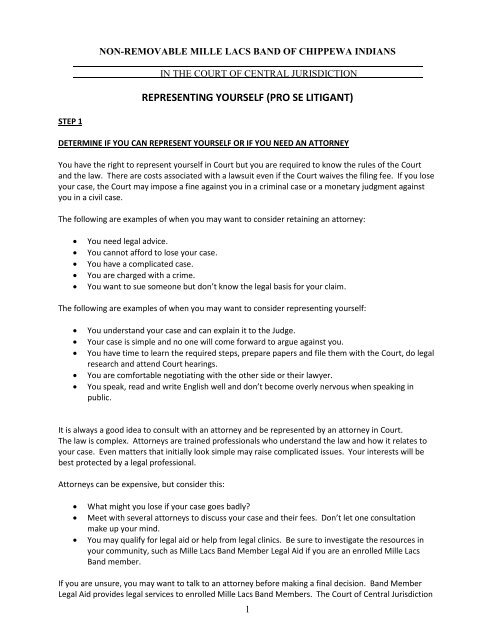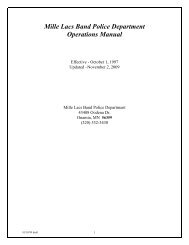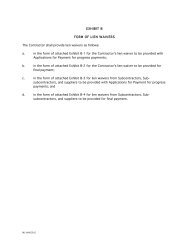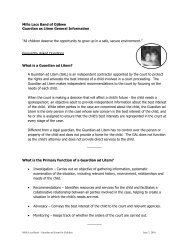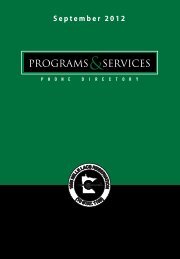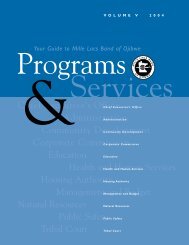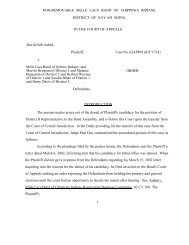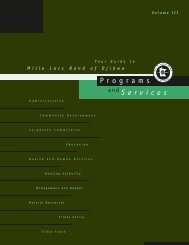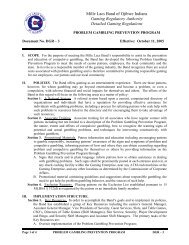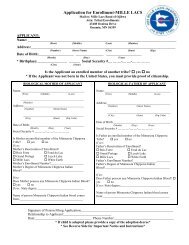Representing Yourself - Mille Lacs Band of Ojibwe
Representing Yourself - Mille Lacs Band of Ojibwe
Representing Yourself - Mille Lacs Band of Ojibwe
You also want an ePaper? Increase the reach of your titles
YUMPU automatically turns print PDFs into web optimized ePapers that Google loves.
NON-REMOVABLE MILLE LACS BAND OF CHIPPEWA INDIANS<br />
IN THE COURT OF CENTRAL JURISDICTION<br />
REPRESENTING YOURSELF (PRO SE LITIGANT)<br />
STEP 1<br />
DETERMINE IF YOU CAN REPRESENT YOURSELF OR IF YOU NEED AN ATTORNEY<br />
You have the right to represent yourself in Court but you are required to know the rules <strong>of</strong> the Court<br />
and the law. There are costs associated with a lawsuit even if the Court waives the filing fee. If you lose<br />
your case, the Court may impose a fine against you in a criminal case or a monetary judgment against<br />
you in a civil case.<br />
The following are examples <strong>of</strong> when you may want to consider retaining an attorney:<br />
<br />
<br />
<br />
<br />
<br />
You need legal advice.<br />
You cannot afford to lose your case.<br />
You have a complicated case.<br />
You are charged with a crime.<br />
You want to sue someone but don’t know the legal basis for your claim.<br />
The following are examples <strong>of</strong> when you may want to consider representing yourself:<br />
<br />
<br />
<br />
<br />
<br />
You understand your case and can explain it to the Judge.<br />
Your case is simple and no one will come forward to argue against you.<br />
You have time to learn the required steps, prepare papers and file them with the Court, do legal<br />
research and attend Court hearings.<br />
You are comfortable negotiating with the other side or their lawyer.<br />
You speak, read and write English well and don’t become overly nervous when speaking in<br />
public.<br />
It is always a good idea to consult with an attorney and be represented by an attorney in Court.<br />
The law is complex. Attorneys are trained pr<strong>of</strong>essionals who understand the law and how it relates to<br />
your case. Even matters that initially look simple may raise complicated issues. Your interests will be<br />
best protected by a legal pr<strong>of</strong>essional.<br />
Attorneys can be expensive, but consider this:<br />
<br />
<br />
<br />
What might you lose if your case goes badly?<br />
Meet with several attorneys to discuss your case and their fees. Don’t let one consultation<br />
make up your mind.<br />
You may qualify for legal aid or help from legal clinics. Be sure to investigate the resources in<br />
your community, such as <strong>Mille</strong> <strong>Lacs</strong> <strong>Band</strong> Member Legal Aid if you are an enrolled <strong>Mille</strong> <strong>Lacs</strong><br />
<strong>Band</strong> member.<br />
If you are unsure, you may want to talk to an attorney before making a final decision. <strong>Band</strong> Member<br />
Legal Aid provides legal services to enrolled <strong>Mille</strong> <strong>Lacs</strong> <strong>Band</strong> Members. The Court <strong>of</strong> Central Jurisdiction<br />
1
can provide you with a list <strong>of</strong> attorneys admitted to the <strong>Mille</strong> <strong>Lacs</strong> <strong>Band</strong> Bar Association. The website<br />
www.mncourts.gov provides a self-help center and a link that provides assistance in obtaining an<br />
attorney.<br />
STEP 2<br />
PREPARING YOUR CASE<br />
If you decide to represent yourself, you need to manage all aspects <strong>of</strong> your case.<br />
Familiarize yourself with the local Court rules. Rules and procedures vary slightly from Court to Court<br />
and you will need to know the rules that apply in the Court that will hear your case. Obtain a copy <strong>of</strong><br />
the local rules from your Court. The <strong>Mille</strong> <strong>Lacs</strong> <strong>Band</strong> Tribal Statutes and Court Rules are available online<br />
at the <strong>Mille</strong> <strong>Lacs</strong> <strong>Band</strong> <strong>of</strong> <strong>Ojibwe</strong> website, millelacsband.com.<br />
Make sure you understand the Court rules and comply with them, especially the prohibition against ex<br />
parte communication. Ex parte communication occurs when a party to a case talks or writes or<br />
otherwise communicates directly with the Judge about issues in the case without the other party’s<br />
knowledge. This ban on direct communication helps the Judge decide the case fairly since his/her<br />
decision is based only on the evidence, arguments presented to the court and applicable law. Do not<br />
call or email the Judge directly. Communicate with the Judge through court staff.<br />
Make sure your filings and documents conform to local standards. Generic forms and sample filings are<br />
available in books and on the internet. However, these forms may not conform to the standards <strong>of</strong> the<br />
Court that will hear your case. To make sure that your documents will be accepted, ask the Court that<br />
will hear your case for forms. <strong>Mille</strong> <strong>Lacs</strong> <strong>Band</strong> Tribal Court forms are available on the <strong>Mille</strong> <strong>Lacs</strong> <strong>Band</strong> <strong>of</strong><br />
<strong>Ojibwe</strong> website or can be obtained at the <strong>Mille</strong> <strong>Lacs</strong> <strong>Band</strong> Tribal Court.<br />
Respond to all inquiries on time. During trial preparations, you may receive inquiries from the Court or<br />
the opposing party. For example, the opposing party may be entitled to “discovery” to learn about<br />
evidence or testimony you plan to introduce. If you fail to respond to such inquiries, you may limit your<br />
ability to present your case. Always serve the opposing party a copy <strong>of</strong> the documents you file with the<br />
Court.<br />
Rules about admissible evidence are complicated. There are many possible reasons that evidence or<br />
testimony you think is important may not be admissible in Court. Since questions about what evidence<br />
is admissible are legal questions, neither Court staff nor the Judge may answer them ahead <strong>of</strong> time. If<br />
your case will involve evidence that may be contested in Court, you may want to consider retaining an<br />
attorney.<br />
Prepare your evidence. If your case will involve evidence – documents, pictures, cost estimates, receipts<br />
or other items – bring the original and 2 copies to Court. The originals are for the Court, one copy is for<br />
you and one copy is for the opposing party. Make sure you are able to verify that the documents are<br />
what you say they are and contain accurate information. Some documents cannot be used as evidence<br />
unless the right person is in the Courtroom to explain the document and answer questions about it.<br />
Make sure witnesses are prepared and available for Court. If your case will involve testimony from<br />
witnesses, you need to work with them before you and they appear in Court. Make sure your witnesses<br />
know what you will ask, and instruct them to answer truthfully. Your witnesses must be present at your<br />
trial and prepared to answer questions from the opposing party or his/her attorney. When you<br />
represent yourself, you must handle all legal questions as well as deadlines, evidence and witnesses as<br />
2
well as any other issues that may arise. Even a seemingly simple case can demand a lot <strong>of</strong> your time and<br />
attention.<br />
Keep your contact information with the Court current so that Court notices and orders will reach you.<br />
STEP 3<br />
In the Courtroom<br />
Make a good impression and dress appropriately. Arrive on time with all your materials.<br />
Respect the Court. Stand when the Judge enters or leaves the Courtroom and when you speak to the<br />
Judge. 1 During the hearing, you should listen carefully, ask permission <strong>of</strong> the Judge to speak, talk directly<br />
to the Judge and not the opposing party. When you speak to the Judge, start by saying “Your Honor”.<br />
Speak loudly and clearly. Never interrupt the other side or the Judge when speaking. Remember that<br />
only one person can speak at a time.<br />
Respect the opposing party and do not argue with the opposing party in front <strong>of</strong> the Judge. Use<br />
respectful terms <strong>of</strong> address.<br />
BE PREPARED. This may be the only chance you will have to present your case. Make sure all evidence<br />
is prepared. Make sure all witnesses are present in the Courtroom and available to testify. The better<br />
prepared you are, the better the case will go.<br />
Before you leave the Courtroom, make sure you understand what happens next:<br />
<br />
<br />
<br />
<br />
<br />
Do you need to come back for another hearing?<br />
Do you need to prepare a written argument?<br />
Do you need to take other steps or actions?<br />
Will the Judge issue an order?<br />
Politely ask questions if you do not understand what will happen next.<br />
The Role <strong>of</strong> the Judge<br />
Your case will be heard and decided by a Judge or a Special Magistrate. Keep in mind that the role <strong>of</strong><br />
the Judge is to be an impartial referee in the dispute between you and the opposing party.<br />
The Judge may not help you present your case. Helping you, by pointing out mistakes or telling you<br />
what to do next, would be unfair to the opposing party. When you decide to represent yourself, you<br />
take on the full responsibility <strong>of</strong> presenting your case.<br />
The Judge may not speak with you about your case when the opposing party is not present. This is true<br />
even if the issue you want to speak with the Judge about seems like a simple procedural issue. Such<br />
communication would be unfair to the opposing party.<br />
The Judge will decide the case based on the facts presented in Court and the applicable law. The Judge<br />
may only consider the facts as presented in Court, through evidence and testimony. You need to make<br />
sure that all facts supporting your case are properly presented. The Judge also must follow the laws that<br />
apply. Sometimes the law dictates which facts the Judge may and may not consider. You need to make<br />
sure that you present the facts that the law requires or permits.<br />
1 Judge Richard Osburn does not require persons in the Courtroom to stand when he enters or leaves. Other<br />
Judges <strong>of</strong> the Court <strong>of</strong> Central Jurisdiction may require this. The bailiff or Court clerk will announce “all rise” if you<br />
are required to stand.<br />
3
Court Staff<br />
Court staff cannot give legal advice. You may have questions that Court staff are not permitted to<br />
answer.<br />
Court staff may not:<br />
Provide you with legal research.<br />
Tell you what sort <strong>of</strong> claim to file or what to write on forms.<br />
Tell you what to say in Court.<br />
Give an opinion about how a Judge is likely to decide your case.<br />
Give you information that they would not give to the opposing party.<br />
Tell you about a Judge’s decision before it is issued by the Judge.<br />
Court staff may:<br />
Answer questions about how the Court works.<br />
Explain terms used in the Court process.<br />
Give you information from your Court file.<br />
Provide you with Court forms and documents.<br />
Court staff are there to help those who use the Court. They can usually tell you how to do things, but<br />
cannot advise you about what you ought to do. Please be courteous to the staff.<br />
4


